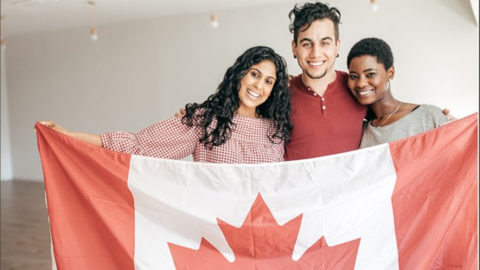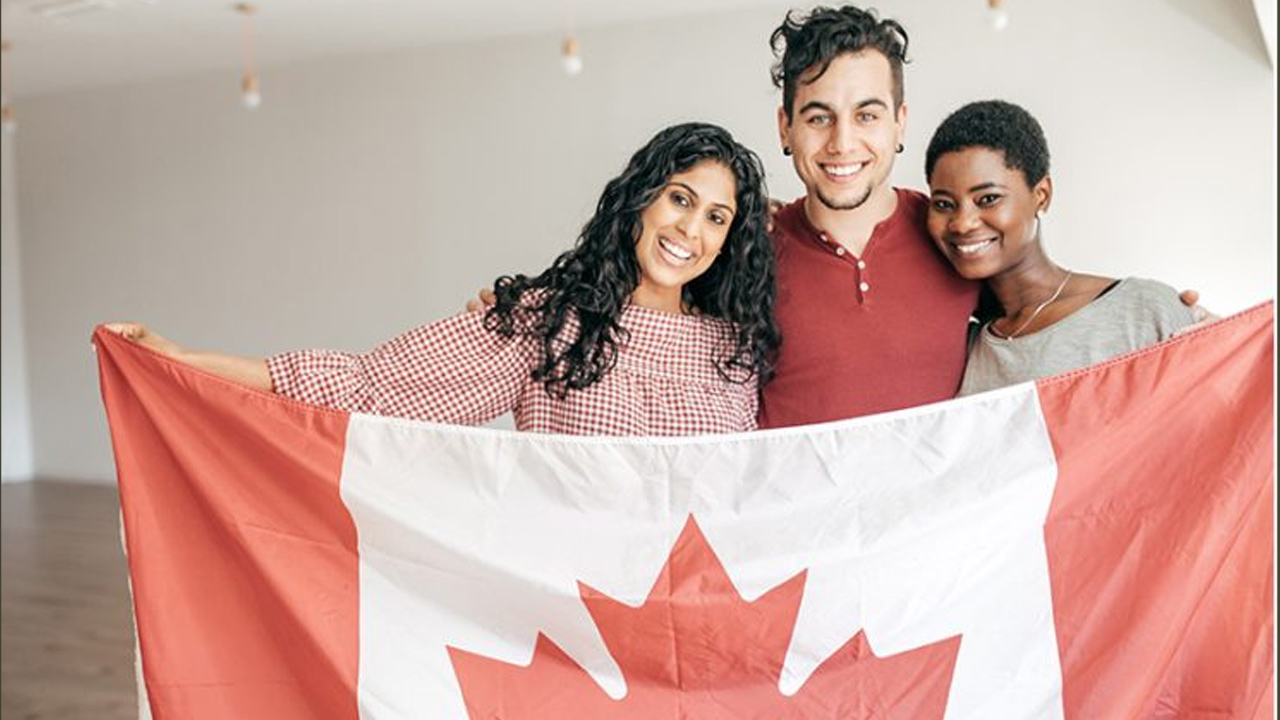Stacy Lee Kong: “If It Feels Like Racism In Canada Is Getting Worse, That’s Because It Is”
So why do we still think we're better than our neighbours to the south?

It has not been a good month for “race-based violence.”
On July 13, an Indigenous man in Thunder Bay, Ont. was allegedly assaulted, in what local leaders are calling a hate crime.
Two days later, two brothers, 19-year-old Janis Corhamzic and 27-year-old Adem Corhamzic, allegedly assaulted a 39-year-old Muslim man, beating him so badly he ended up with facial fractures and needed surgery to stop brain hemorrhaging, according to his wife. He remains in the intensive care unit at Toronto’s Saint Michael’s Hospital, where police say he is in serious but stable condition.
Two days after that, a video started making the rounds on social media that showed a white man preventing another man, this one a person of colour, from leaving a London, Ont. grocery store. According to the caption posted by Katie Pocasangre Montoya, who recorded the video on July 17, the first man actually called the police, who he wanted to come to the store to make an arrest. Describing the situation she recorded, Montoya wrote that, “[the white man] continues to ask if he’s scared to be deported & asked the young man to show his Canadian documentation, & tells him if he leaves the store he will conduct a ‘citizen’s arrest’ on behalf of the police.”
https://www.facebook.com/kskarlett.montoya/videos/10160494406395577/
If it seems like people are expressing hatred more openly, it’s because they are
This is not just a Canadian problem, of course. This summer, we’ve seen a truly astounding number of stories about white people calling the police on Black people for literally just living their lives (think, BBQ Becky, Permit Patty, Pool Patrol Paula AND Pool Patrol Paul, just to name a few), a decision that can have lethal consequences. And it’s hard not to wonder if the tragic murder of Nia Wilson, who was stabbed to death by a white man while taking the train home with her sister in Oakland, Calif., was racially motivated. As Oakland’s mayor, Libby Schaaf, noted in a statement, “it’s important [to] acknowledge that this horrific crime has a context. Although investigators currently have no evidence to conclude that this tragedy was racially motivated or that the suspect was affiliated with any hate groups, the fact that his victims were both young African American women stirs deep pain and palpable fear in all of us who acknowledge the reality that our country still suffers from a tragic and deeply racist history.”
But where we have come to expect racism from our neighbours to the south, we seem to think Canada is somehow immune to this particular social ill. Every time we hear about another example of blatant racism, we tend to be shocked, as if we’ve collectively agreed that sure, things happen here—but it’s nowhere near as bad as it is there. That’s B.S., obviously. Police-reported hate crimes have steadily risen over the past few years, from 1,167 incidents in 2013 to 1,409 in 2016 (stats for 2017 won’t be released until later this year). They’re also getting more violent; according to the same Statistics Canada report, in 2016, “the number of violent hate crimes rose 16% from the previous year (from 487 to 563 violent incidents), driven by increases in common assault, criminal harassment and uttering threats.” And keep in mind, that’s just the incidents police know about—a 2014 Statistics Canada report found that, in two-thirds of cases, victims of crimes don’t report them to the police.
That being said, I do think these incidents feel different. And so do many others that have unfolded over the past 18 months: the brutal (and lethal) attack on Barb Kentner last January, which her cousin called a “horrific act of racism;” the white woman in Mississauga who demanded a white doctor last June; the white woman who went on a racist tirade at a Lethbridge, Alta. Denny’s in May after hearing three friends chatting in Dari; the Islamophobia that has cropped up in comments sections and Twitter mentions after the tragic Danforth shooting on July 22.
It’s how openly these incidents happen, I think, and how shameless the perpetrators seem.
When I was a kid, racism seemed more subtle
This is definitely a sign of my own privilege, but for me, prejudice has always been subtle, so indirect that I didn’t always recognize it. I was born in Trinidad, but moved with my family to Oakville, a Toronto suburb just west of Mississauga, when I was four. Though I was the only non-white kid on my street and often in my class, I felt pretty accepted. When my mom asked my kindergarten teacher how I was doing as the only brown kid in class, the teacher replied, “Oh, is she brown?” I took it as an indicator that I was doing exactly what I wanted to do at the time: fit in. Later in elementary school, when a kid called me a “Paki” a few times, I wasn’t hurt as much as annoyed at the inaccuracy. (Really, though—had he ever looked at a map??) And when teachers remarked on how “well-spoken” I was, I thought it was a compliment.
Now that I look back on these things, though, I see them differently. Those little comments were actually pretty damaging—why else would they stand out so clearly in my memories? When my kindergarten teacher implied that she didn’t see colour and that I was just like anyone else, she ignored reality. There were no other non-white kids in my class, and no other recent immigrants; I was different. When that kid called me a “Paki,” it was a racist slur, whether or not it hurt my feelings at the time. And it shouldn’t have surprised anyone that a happy kid who read a lot was well-spoken. As these things dawned on me, I felt stupid for not having seen what was really going on back then—and, belatedly, sad that these people who I liked, and who I know liked me, still didn’t seem to know how to relate to me.
But still, I reassured myself that at least people weren’t shouting racial slurs at me, no one was going to attack me for walking down the street with a white boyfriend and I had legal protection from discrimination, so I wouldn’t be denied health care or a job or service at a store because of my race.
Now, I wonder if we’ve gone backwards
Recently, though, I’ve been feeling less reassured. Yes, this is a belated realization; Andrew Loku wasn’t the first Black man killed by police, Indigenous women didn’t just start facing a higher murder rate than their non-Indigenous peers and Muslim-Canadians have always faced Islamophobia, particularly after 9/11. But what I’m feeling now isn’t only newfound cynicism. Something really has changed. It’s as if people have been given permission—by the rise of the alt-right movement, or Donald Trump, or our own politicians—to be their very worst selves, and to give in to base instincts that separate people into us vs. them. No, it’s as if they have been empowered to behave this way. They’ve been shown, by word and deed, that it’s okay. It’s desirable, even.
To be clear, it’s not that I think those subtle forms of racism are somehow better than the loud and proud variety that’s currently rearing its head. A healthcare system that’s biased against Indigenous and racialized people leads to worse care for those populations. Redlining, the racist housing policy that kept non-white populations out of more desirable neighbourhoods, also prevented them from accumulating generational wealth. Racial profiling at school, the corner store or in our neighbourhoods has serious psychological effects and stunts the potential of racialized and Indigenous kids. But I used to feel like society was slowly moving toward enlightenment and equality, and that already we’d made a lot of progress.
Now, I’m scared that this isn’t the case.
https://twitter.com/nedasoc/status/1019579447291338752
Seriously: I fear for my safety and the safety of my loved ones in a way I never did before. Because these are clearly not isolated or rare incidents—they’re signs that our culture has shifted. Racist violence is on the rise in Canada, the U.S. and overseas. And even though some of these incidents are “just words,” well, that’s still a precursor to racially-motivated violence, as we’ve seen in the aftermath of Trump’s election, both in the U.S. and here at home.
We’re in a different place now than we were when I was growing up. And even if the world course-corrects and our politicians no longer spew racist rhetoric or the alt-right spontaneously dismantles itself (unlikely, I know), we can’t go back. At least, I can’t. In the back of my mind, I’ll always wonder what the next incident will be, and whether a family member, a friend or I will be at the centre of it.
Because it has become clear that we haven’t made as much progress as I thought, or that maybe whatever progress we did make is now unravelling. It’s a sign that, for some Canadians, people who look like me will never belong here, no matter how well we integrate, how hard we work or how much we want to.









